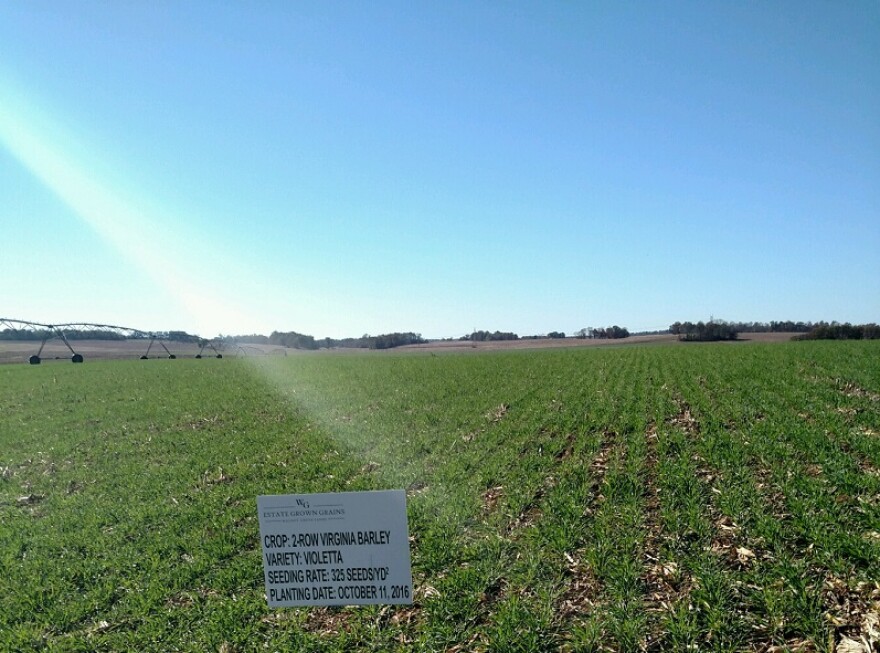On a cloudy November day, a small group of Castle & Key employees huddle shoulder-to-shoulder as a delivery truck pulls through the distillery’s rod iron gates. Within a few minutes, creamy white corn kernels pelt into a large metal basin below the truck, while master distiller Marianne Barnes captures the moment on her iPhone.
“So we are, as of today, about three weeks away from our first production here at Castle & Key for the first time in over 40 years -- almost half a century,” Barnes says. “It’s just incredible. Receiving this grain today is a huge part of that.”
But this delivery isn’t just important to Barnes -- who has spent the last year refurbishing the former Old Taylor Bourbon Distillery in Frankfort into Castle & Key. It also signifies a big moment for the farmers who harvested it.
Don and Sam Halcomb are a father and son team that manages Walnut Grove Farms, located in Logan County, Kentucky -- about 50 miles north of Nashville. The farm has been in their family since the mid-19th century. But after Sam returned home in 2010 to help with the family business, it has been in the process of a modern shift.
Back in the day, Walnut Grove focused on quantity -- strict commodity production. More corn meant more money; but times are changing. The Halcombs say in order to keep their family farm profitable, they have to pay closer attention to quality.
The average age of the American farmer is 58, and some research says 70 percent of farms in agricultural states will undergo a generational shift in the next decade. But less than 10 percent of the nation’s 2.1 million farmers have transition plans in place to pass their land and business to the next generation.
The Halcombs say in order to keep their family farm profitable, they have to pay closer attention to emerging consumer trends -- specifically traceability and sustainability -- and the industries that prioritize them.
Barnes is one of their first customers under the new model -- and the partnership makes sense. She wants to hold her bourbon to the same bottled-in-bond standards for which Colonel Taylor of Old Taylor Distillery petitioned heavily in the 1800s.
“So we got to thinking about, you know, if we are going to furnish corn to Marianne with the Colonel Taylor history, that we ought to be thinking about the corn and the way we produce it on our farm,” Don says.
He continues: “We ought to have one farmer growing it, which is kind of unusual if you are sourcing grain. We ought to store it at one location. We ought to be able to identify which season it’s grown.”
But what does this shift look like on the farm? About two weeks later, I visit Walnut Grove to find out.
Partnering with Evolving Industries
The Halcombs lead me through rows and rows of crops dotted with small informational signs.
“The difference in working with a single farm like ours versus sourcing grain from a grain elevator is that from the very beginning, you know how the farm is managed,” Sam Halcomb says.
The new Walnut Grove model requires more customer engagement. The farm’s clients want to know more about the grain they are buying -- down to the day the crop was planted and how much rain they received pre-harvest.
We continue to wander through different experimental varieties grown in small plots -- grains the Holcombs are playing with for their malting and tasting capabilities.
But at the very end of the field is a large expanse of green.
It’s the Holcomb's thoroughbred barley -- their bread and butter crop, says Don Halcomb. It's used in another local libation, Goodwood Brewing Company’s Louisville Lager, the first and only beer brewed with 100 percent Kentucky-grown grains.
While most malting grains used by breweries are grown outside the state, Goodwood Chief Operating Officer Joel Halbleib connected with Walnut Grove when he decided to take the “Kentucky Proud” label on his bottle more seriously.
“We put Kentucky Proud on our bottle and actually one of the home brewers for the home brew meeting kind of giggled at me and he was like ‘Kentucky Proud? So what is Kentucky in that bottle?’” Halbleib says. “And water was about it.”
By partnering with emerging industries with a hyper-local focus like craft distilling and brewing, Walnut Grove Farm has set themselves up for success as a modern family farm that can weather a generational shift.
Especially since often these companies are adapting alongside them.
“With this locavore movement and this farm-to-table, people and consumers of products -- any product -- are interested in where the ingredients come from.” Barnes says. “So understanding exactly where the grains come from, how they were grown, really the responsibility that we have to the consumer is important. “
Or as Sam Halcomb says:
“From the very beginning, from soil to bottle, she (Barnes) knows the full story.”







